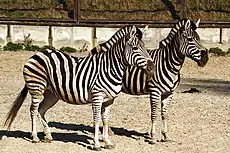zebra
English

Etymology
1600; borrowed from Italian zebra, from Portuguese zebra, zebro (“zebra”), from Old Galician-Portuguese enzebro, ezebra, azebra (“wild ass”), from earlier cebrario (882), ezebrario (897), from Vulgar Latin *eciferus, from Latin equiferus (“wild horse”) (Pliny), from equus (“horse”) + ferus (“wild”).(Can this(+) etymology be sourced?)
While the word was traditionally pronounced with a long vowel in the first syllable in standard English, during the twentieth century a vowel shift occurred in regions of England, with the shortening of the first vowel.[1] This pronunciation is now used throughout the UK and most Commonwealth nations. The long-vowel pronunciation remains standard in Canadian and American English.
(referee): In reference to the black and white striped shirts they wear.
Pronunciation
- (UK, Commonwealth) IPA(key): /ˈzɛbɹə/
Audio (UK) (file) - Hyphenation: zeb‧ra
- (Canadian, US and traditional British English) IPA(key): /ˈziːbɹə/
Audio (US) (file) - Hyphenation: ze‧bra
- Rhymes: (UK, Commonwealth) -ɛbɹə, -iːbɹə
Noun
zebra (plural zebra or zebras)
- Any of three species of subgenus Hippotigris: E. grevyi, E. quagga, or E. zebra, all with black and white stripes and native to Africa.
- (sports, slang) A referee.
- (medicine, slang) An unlikely diagnosis, especially for symptoms probably caused by a common ailment. (Originates in the advice often given to medical students: "when you hear hoofbeats, think of horses, not zebras".)
- (medicine, by extension) Someone who has Ehlers-Danlos syndrome or hypermobility spectrum disorder
- 2022 December 24, CNN:
- “I was told in medical school, ‘when you hear hoofbeats think horses, not zebras,’” she says. Many trainee doctors receive the same advice – when a patient presents with symptoms, “look for the common thing.” That’s why EDS patients commonly refer to themselves as zebras – and also use the fabulous collective noun “dazzle.” The name represents rarity and evokes the stripy stretch marks that are a common feature on EDS skin.
- (vulgar, derogatory, slang, ethnic slur) A biracial person, specifically one born to a Sub-Saharan African person and a white person.
- 2021 April 10, Alex Clark, “‘I’m 51, I can say what I want’: Leone Ross has overcome her fears”, in The Guardian:
- “People change countries for all kinds of reasons,” Ross tells me. “But at least one of them was that she had this light-skinned, mixed-race child who had already been called a zebra at school.”
- (informal) A fish, the zebra cichlid.
- Any of various papilionid butterflies of the subgenus Paranticopsis of the genus Graphium, having black and white markings.
- A zebra crossing.
- 2010, Mick Herron, Slow Horses, page 247:
- On his way home he'd picked up two economy-sized bags of tortilla chips, and had dropped both when a twat in a Lexus honked him on a zebra . . .
Usage notes
- (biracial person): The term zebra, as used in its pejorative sense, was popularized on the television situation comedy The Jeffersons. The term was used by the series protagonist, George Jefferson (Sherman Hemsley), to express disdain for his daughter-in-law, Jenny Willis Jefferson, whose father was white and mother was black.
Hyponyms
- (animal of genus Equus): Burchell's zebra, Grevy's zebra, quagga, plains zebra, mountain zebra
- (unlikely diagnosis): fascinoma
Derived terms
- Burchell's zebra (Equus quagga burchellii)
- Chapman's zebra (Equus quagga chapmani)
- common zebra (Equus quagga)
- Crawshay's zebra (Equus quagga crawshayi)
- Damaraland zebra (Equus quagga burchellii)
- Grant's zebra (Equus quagga boehmi)
- Grevy's zebra, Grévy's zebra (Equus grevyi)
- Hartmann's mountain zebra (Equus zebra hartmannae)
- maneless zebra (Equus quagga borensis)
- mountain zebra (Equus zebra)
- Persian zebra (Equus hermionus onager)
- plains zebra (Equus quagga
- Selous's zebra (Equus quagga selousi)
- zebra acara (Nannacara adoketa)
- zebra antelope (Cephalophus zebra)
- zebra blue butterfly (Leptotes plinius )
- zebra butterfly (Heliconius charithonia)
- zebra cake
- zebra caterpillar (Melanchra picta)
- zebra chip
- zebra cichlid (Amatitlania nigrofasciata)
- zebra crossing
- zebra danio (Danio rerio)
- zebra dove (Geopelia striata)
- zebra duiker (Cephalophus zebra)
- zebra finch (Taeniopygia guttata)
- zebrafish, zebra fish (Danio rerio etc.)
- zebra giraffe (Okapia johnstoni)
- zebra haworthia (Haworthiopsis attenuata)
- zebraic
- zebralike
- zebra lionfish (Dendrochirus zebra)
- zebra mongoose (Mungos mungo)
- zebra mouse
- zebra mule
- zebra mussel (Dreissena polymorpha)
- zebra opossum (†Thylacinus cynocephalus)
- zebra parakeet
- zebra parrot (Melopsittacus undulatus)
- zebra plant
- zebra poison (Euphorbia arborea)
- zebra shark (Stegostoma fasciatum)
- zebra spider (Salticus scenicus)
- zebrass
- zebra striping
- zebra swallowtail (Protographium marcellus)
- zebra-tailed lizard, Callisaurus draconoides
- zebra turkeyfish (Dendrochirus zebra)
- zebra wolf (†Thylacinus cynocephalus)
- zebrawood (Microberlinia spp., etc.)
- zebrine
- zebroid
- zeedonk
- zeehorse
- zorse
- Zululand zebra (Equus quagga burchellii)
Translations
|
See also
References
Basque
Pronunciation
Audio (file) - Rhymes: -ebra
- Hyphenation: ze‧bra
Declension
| indefinite | singular | plural | |
|---|---|---|---|
| absolutive | zebra | zebra | zebrak |
| ergative | zebrak | zebrak | zebrek |
| dative | zebrari | zebrari | zebrei |
| genitive | zebraren | zebraren | zebren |
| comitative | zebrarekin | zebrarekin | zebrekin |
| causative | zebrarengatik | zebrarengatik | zebrengatik |
| benefactive | zebrarentzat | zebrarentzat | zebrentzat |
| instrumental | zebraz | zebraz | zebrez |
| inessive | zebrarengan | zebrarengan | zebrengan |
| locative | — | — | — |
| allative | zebrarengana | zebrarengana | zebrengana |
| terminative | zebrarenganaino | zebrarenganaino | zebrenganaino |
| directive | zebrarenganantz | zebrarenganantz | zebrenganantz |
| destinative | zebrarenganako | zebrarenganako | zebrenganako |
| ablative | zebrarengandik | zebrarengandik | zebrengandik |
| partitive | zebrarik | — | — |
| prolative | zebratzat | — | — |
Derived terms
- zebra-bide (“zebra crossing”)
Catalan
Etymology
Inherited from Old Catalan atzebra, from Old Galician-Portuguese *ezevra, *ezevro.
Pronunciation
Derived terms
Further reading
- “zebra” in Diccionari de la llengua catalana, segona edició, Institut d’Estudis Catalans.
Cebuano
Etymology
Borrowed from English zebra, from Italian zebra, from Portuguese zebra, zebro (“zebra”), from Old Galician-Portuguese enzebro, ezebra, azebra (“wild ass”), from earlier cebrario (882), ezebrario (897), from Vulgar Latin *eciferus, from Latin equiferus (“wild horse”) (Pliny), from equus (“horse”) + ferus (“wild”).
Corsican
Etymology
From Portuguese zebra (“wild horse”), from zebro, from Old Galician-Portuguese zevro, from *ezevro, from Vulgar Latin *eciferus, from Latin *equiferus, from equus (“horse”) + ferus (“wild”).
Pronunciation
- IPA(key): /ˈzɛbra/
References
Crimean Tatar
Declension
Czech
Pronunciation
- IPA(key): [ˈzɛbra]
Declension
Danish
Declension
| common gender |
Singular | Plural | ||
|---|---|---|---|---|
| indefinite | definite | indefinite | definite | |
| nominative | zebra | zebraen | zebraer | zebraerne |
| genitive | zebras | zebraens | zebraers | zebraernes |
Dutch
.jpg.webp)
.jpg.webp)
Etymology
Borrowed from Portuguese zebra, from Vulgar Latin *eciferus, from Latin equiferus (“wild horse”). The second sense is a shortening of zebrapad.
Pronunciation
- IPA(key): /ˈzeː.braː/
Audio (file) - Hyphenation: ze‧bra
Noun
zebra m (plural zebra's, diminutive zebraatje n)
- A zebra, a black-and-white striped equid of the genus Equus; Equus zebra, Equus quagga or Equus grevyi. [from late 16th c.]
- A zebra crossing, a pedestrian crossing. [from mid 1950s.]
- Synonym: zebrapad
Hypernyms
- (pedestrian crossing): oversteekplaats
Hyponyms
- (zebra): quagga
Esperanto
Hypernyms
- ekveda (“equid”)
Hungarian
.jpg.webp)

Pronunciation
- IPA(key): [ˈzɛbrɒ]
- Hyphenation: zeb‧ra
- Rhymes: -rɒ
Noun
zebra (plural zebrák)
- (biology) zebra (animal)
- (road transport) pedestrian crossing, crosswalk, zebra crossing
Declension
| Inflection (stem in long/high vowel, back harmony) | ||
|---|---|---|
| singular | plural | |
| nominative | zebra | zebrák |
| accusative | zebrát | zebrákat |
| dative | zebrának | zebráknak |
| instrumental | zebrával | zebrákkal |
| causal-final | zebráért | zebrákért |
| translative | zebrává | zebrákká |
| terminative | zebráig | zebrákig |
| essive-formal | zebraként | zebrákként |
| essive-modal | — | — |
| inessive | zebrában | zebrákban |
| superessive | zebrán | zebrákon |
| adessive | zebránál | zebráknál |
| illative | zebrába | zebrákba |
| sublative | zebrára | zebrákra |
| allative | zebrához | zebrákhoz |
| elative | zebrából | zebrákból |
| delative | zebráról | zebrákról |
| ablative | zebrától | zebráktól |
| non-attributive possessive - singular |
zebráé | zebráké |
| non-attributive possessive - plural |
zebráéi | zebrákéi |
| Possessive forms of zebra | ||
|---|---|---|
| possessor | single possession | multiple possessions |
| 1st person sing. | zebrám | zebráim |
| 2nd person sing. | zebrád | zebráid |
| 3rd person sing. | zebrája | zebrái |
| 1st person plural | zebránk | zebráink |
| 2nd person plural | zebrátok | zebráitok |
| 3rd person plural | zebrájuk | zebráik |
Synonyms
- (crosswalk): gyalogátkelőhely
Further reading
- zebra in Bárczi, Géza and László Országh. A magyar nyelv értelmező szótára (‘The Explanatory Dictionary of the Hungarian Language’, abbr.: ÉrtSz.). Budapest: Akadémiai Kiadó, 1959–1962. Fifth ed., 1992: →ISBN
Indonesian
Italian
Pronunciation
- IPA(key): */ˈd͡zɛ.bra/
- Rhymes: -ɛbra
- Hyphenation: zè‧bra
Latin
Pronunciation
- (Classical) IPA(key): /ˈze.bra/, [ˈd̪͡z̪ɛbrä]
- (modern Italianate Ecclesiastical) IPA(key): /ˈd͡ze.bra/, [ˈd̪͡z̪ɛːbrä]
Latvian

Etymology
Possibly ultimately from a Congolese name for the animal, via Portuguese, via some other European language. Possibly also ultimately from Latin equiferus (“wild horse”), via Portuguese and/or Italian.
Pronunciation
- IPA(key): /ˈzɛbra/
audio (file)
Declension
Polish


Pronunciation
- IPA(key): /ˈzɛb.ra/
Audio 1 (file) Audio 2 (file) - Rhymes: -ɛbra
- Syllabification: zeb‧ra
Noun
zebra f
- zebra (any equid of the subgenus Hippotigris)
- (colloquial) crosswalk, pedestrian crossing, zebra crossing (pedestrian crossing featuring broad white stripes)
- Synonyms: pasy, przejście dla pieszych
- black and white striped pattern
Declension
Descendants
- → Kashubian: zebra
Portuguese



.jpg.webp)
Etymology 1
From zebro, from Old Galician-Portuguese zebro, ezebro (“European wild ass”), from Vulgar Latin *eciferus, from Latin equiferus (“wild horse”), from equus (“horse”) + ferus (“wild”). Compare Spanish cebra.
Senses 2 and 3 of the word comes from the popular Brazilian betting game jogo do bicho, in which the animal is absent, therefore it is unlikely that a zebra will be drawn.
Pronunciation
- (Brazil) IPA(key): /ˈze.bɾɐ/
- (Southern Brazil) IPA(key): /ˈze.bɾa/
- (Portugal) IPA(key): /ˈze.bɾɐ/ [ˈze.βɾɐ]
- Hyphenation: ze‧bra
Noun
zebra f (plural zebras)
- zebra
- (Brazil, slang) A victorious competitor initially thought unlikely to win, especially in sports; an underdog
- Synonym: azarão
- Aquele time ganhou quando todo mundo pensou que ele iria perder, mas que zebra!
- That [soccer] team won when everyone else thought they were going to lose, what an underdog!
- (Brazil, slang) an unexpected result in a competition
- (Brazil, derogatory) idiot, stupid
- Synonym: burro
- (Brazil, informal) prison uniform
- (Portugal, informal) zebra crossing
- (Portugal, informal) vice, a bad habit
- (Beira) a type of lanky spinning top
- (motor racing) curb (line of flat curbstones on the corners of racing tracks)
- zebra pattern
- (obsolete) cow
Usage notes
Quotations
For quotations using this term, see Citations:zebra.
Derived terms
- amboré-zebra (Gobiosoma hemigymnum)
- azebrar
- borboleta-zebra
- bótia-zebra (Botia striata)
- bromélia-zebra (Aechmea chantinii)
- cabrito-zebra (Cephalophus zebra)
- cascudo-zebra (Hypancistrus zebra)
- cirurgião-zebra (Acanthurus lineatus)
- dar zebra
- dourada-zebra (Brachyplatystoma juruense)
- galinha-zebra (Dendrochirus zebra)
- linguado-zebra (Gymnachirus nudus)
- mexilhão-zebra (Dreissena polymorpha)
- moreia-zebra (Gymnomuraena zebra)
- paleta-zebra (Branchiostegus semifasciatus)
- peixe-zebra
- planta-zebra
- tubarão-zebra (Stegostoma tigrinum)
- zebra-comum (Equus quagga)
- zebra-da-montanha (Equus zebra)
- zebra-da-planície (Equus quagga)
- zebra-de-burchell (Equus quagga burchellii)
- zebra-de-chapmann (Equus quagga chapmani)
- zebra-de-grant (Equus quagga boehmi)
- zebra-de-grevy (Equus grevyi)
- zebrado
- zebral
- zebralo
- zebrano
- zebrar
- zebrário
- zebrasno
- zebrino
- zebroide
Related terms
Etymology 2
See the etymology of the corresponding lemma form.
Pronunciation
- (Brazil) IPA(key): /ˈzɛ.bɾɐ/
- (Southern Brazil) IPA(key): /ˈzɛ.bɾa/
- (Portugal) IPA(key): /ˈzɛ.bɾɐ/ [ˈzɛ.βɾɐ]
- Hyphenation: ze‧bra
Verb
zebra
- inflection of zebrar:
- third-person singular present indicative
- second-person singular imperative
Further reading
- “zebra” in iDicionário Aulete.
- “zebra” in Dicionário Aberto based on Novo Diccionário da Língua Portuguesa de Cândido de Figueiredo, 1913
- “zebra” in Dicionário Online de Português.
- “zebra” in Dicionário infopédia da Língua Portuguesa. Porto: Porto Editora, 2003–2024.
- “zebra” in Michaelis Dicionário Brasileiro da Língua Portuguesa.
- “zebra” in Dicionário Priberam da Língua Portuguesa.
Serbo-Croatian
Pronunciation
- IPA(key): /zêbra/
Slovene
Pronunciation
- IPA(key): /zèːbra/, /zéːbra/
Inflection
| Feminine, a-stem | |||
|---|---|---|---|
| nom. sing. | zébra | ||
| gen. sing. | zébre | ||
| singular | dual | plural | |
| nominative (imenovȃlnik) |
zébra | zébri | zébre |
| genitive (rodȋlnik) |
zébre | zéber | zéber |
| dative (dajȃlnik) |
zébri | zébrama | zébram |
| accusative (tožȋlnik) |
zébro | zébri | zébre |
| locative (mẹ̑stnik) |
zébri | zébrah | zébrah |
| instrumental (orọ̑dnik) |
zébro | zébrama | zébrami |
Further reading
- “zebra”, in Slovarji Inštituta za slovenski jezik Frana Ramovša ZRC SAZU, portal Fran
Spanish
Further reading
- “zebra”, in Diccionario de la lengua española, Vigésima tercera edición, Real Academia Española, 2014
Swedish
Alternative forms
Declension
| Declension of zebra | ||||
|---|---|---|---|---|
| Singular | Plural | |||
| Indefinite | Definite | Indefinite | Definite | |
| Nominative | zebra | zebran | zebror | zebrorna |
| Genitive | zebras | zebrans | zebrors | zebrornas |
References
Turkish
Pronunciation
- IPA(key): [ˈzeb.ɾɑ]
Audio (file) - Hyphenation: zeb‧ra
.jpg.webp)